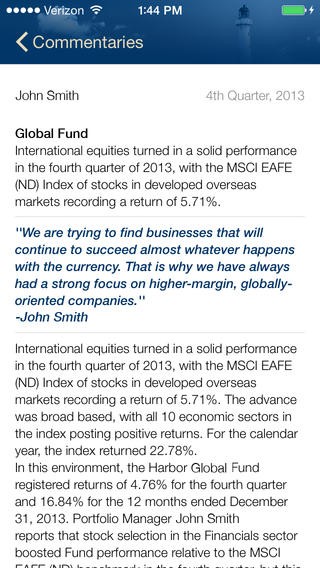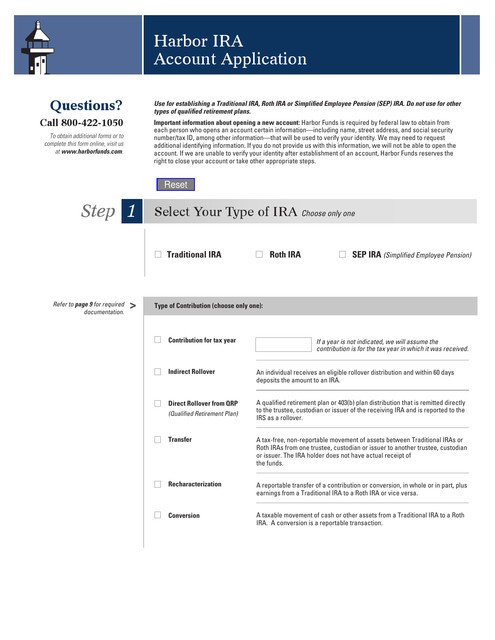Harbor Funds
Post on: 16 Март, 2015 No Comment

Covered shares are shares acquired after January 1, 2012. Covered shares require cost basis and gain/loss reporting, from Harbor, to the shareholder and to the IRS. Cost basis for covered shares is reported on Form 1099-B.
Noncovered shares are shares that were acquired prior to January 1, 2012, for which cost basis reporting to the IRS, from Harbor, is not required. Harbor uses the Average Cost Method to calculate your cost basis on noncovered shares. Cost basis information for noncovered shares is provided to you on Form 1099-B, but is NOT reported to the IRS. You may also view your noncovered cost basis information on your quarterly statement.
No. Harbor Funds will not recalculate redemptions prior to January 1, 2012, but will continue to provide Average Cost basis information for shares acquired prior to January 1, 2012 when available.
The Harbor Funds primary accounting method is Average Cost. You are under no obligation to use this method and may select a different method by using the Cost Basis Election Form.
Harbor Funds offers several accounting methods for valuing the cost of shares sold in an account. Please review the following available methods:
- Average Cost (ACST) Calculates the cost of shares in an account by averaging the cost of all purchases made after January 1, 2012. The basis of the shares redeemed, which are redeemed in a first-in-first-out order, is determined by multiplying the shares redeemed by the average cost per share. This is Harbor Funds’ primary cost basis method.
- First In, First Out (FIFO) Shares acquired first in the account are the first shares depleted to determine the cost basis or gain/loss.
- Last In, First Out (LIFO) Shares acquired last in the account are the first shares depleted to determine the cost basis or gain/loss.
- Highest Cost, First Out (HIFO) Shares acquired with the highest cost per share in the account are the first shares depleted to determine the cost basis or gain/loss.
- Lowest Cost, First Out (LOFO) Shares acquired with the lowest cost per share in the account are the first shares depleted to determine the cost basis or gain/loss.
- Loss/Gain Utilization (LGUT) Shares with losses are depleted before shares with gains. For shares that are sold at a loss, shares owned one year or less (short-term) will be sold before shares owned more than one year (long-term). For shares that sold at a gain, shares with long-term gains will be sold before shares with short-term gains. Because tax rates for long-term gains are generally favorable, long-term gains are given priority over short-term gains to minimize the current tax liability.
- Specific Lot Identification (SLID) Shares that are specifically selected by the shareholder are depleted to determine the cost basis or gain/loss. Specific Lot Identification can only be used at the time of the transaction to override the current cost basis accounting method. You may not select this as your standard cost basis method.

Please keep in mind that each of these cost basis methods applies only to covered shares, which are shares purchased after January 1, 2012.
Since each shareholder’s tax situation is different, you may want to consult your qualified tax advisor for guidance on your cost basis selection.
If you have any questions, please do not hesitate to contact us at 800-422-1050. Our Shareholder Services Representatives are available Monday through Friday, 8 a.m. to 6 p.m. Eastern time, to answer your questions.
For accounts using average cost, which is Harbor’s primary cost basis method, we will sell your oldest shares first. If your account holds both noncovered and covered shares, your oldest shares would be noncovered, and those would be sold first. Once all noncovered shares are sold, Harbor will sell the covered shares.
Please note that average cost for noncovered and covered shares are tracked separately, so you will have two average cost figures.
Online
If you have established Online Access for your account you may elect a new cost basis method, for your existing account(s) and future accounts, via our website 24 hours a day. To register for Online Access or log in to your account, click here .
By Mail
Yes. You are required to report cost basis information for all shares redeemed or exchanged, as well as capital gains and losses on your transactions for both covered and noncovered shares.
When reporting cost basis information on your federal and state income taxes, you should carefully review the cost basis information provided by Harbor Funds and make any necessary adjustment to cost basis, holding periods or wash sales. You are solely responsible for complying with all federal and state income tax laws when filing income tax returns.
Under current IRS regulations, a wash sale occurs when a shareholder sells mutual fund shares at a loss and within 30 days before or after the sale, the shareholder purchased substantially identical shares. If a wash sale is identified, this loss would be disallowed for the current year.
For the purpose of determining wash sales, Harbor tracks purchases and sales of identical shares within the same account. If a wash sale occurred, it will be reported as such on Form 1099-B. Please note that Harbor does not track wash sales across different registrations (for example, between an individual account and a joint account) and shareholders are still obligated to correctly account for all wash sales when filing an income tax return.
If you have already sold, exchanged or transferred shares while using average cost, you are locked into average cost for those shares that were acquired before you changed your method. Any new shares acquired after you change your method will use the new method selected.
If you have not sold, exchanged or transferred shares while using average cost, your new method will apply to all covered shares in your account.














